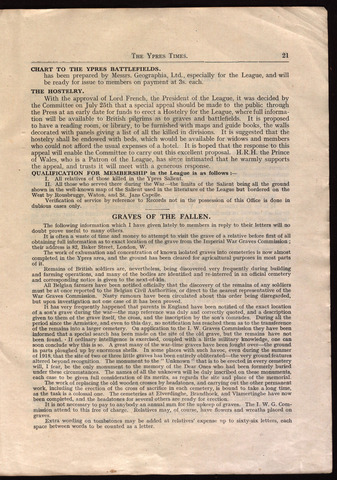21
The Ypres Times.
has been prepared by Messrs. Geographia, Ltd.especially for the League, and will
be ready for issue to members on payment at 3s. each.
With the approval of Lord French, the President of the League, it was decided by
the Committee on July 25th that a special appeal should be made to the public through
the Press at an early date for funds to erect a Hostelry for the League, where full informa
tion will be available to British pilgrims as to graves and battlefields. It is proposed
to have a reading room, or library, to be furnished with maps and guide books, the walls
decorated with panels giving a list of all the killed in divisions. It is suggested that the
hostelry shall be endowed with beds, which would be available for widows and members
who could not afford the usual expenses of a hotel. It is hoped that the response to this
appeal will enable the Committee to carry out this excellent proposal. H.R.H. the Prince
of Wales, who is a Patron of the League, has since intimated that he warmly supports
the appeal, and trusts it will meet with a generous response.
GRAVES OF THE FALLEN.
CHART TO THE YPRES BATTLEFIELDS.
THE HOSTELRY.
QUALIFICATION FOR MEMBERSHIP in the League is as follows
I. All relatives of those killed in the Ypres Salient.
II. All those who served there during the War-the limits of the Salient being all the ground
shown in the well-known map of the Salient used in the literature of the League but bordered on the
West by Rousbrugge, Waton, and St. Jans Capelle.
Verification of service by reference to Records not in the possession of this Office is done in
dubious cases only.
The following information which I have given lately to members in reply to their letters will no
doubt prove useful to many others.
It is often a waste of time and money to attempt to visit the grave of a relative before first of all
obtaining full information as to exact location of the grave from the Imperial War Graves Commission
their address is 82, Baker Street, London, W.
The work of exhumation and concentration of known isolated graves into cemeteries is now almost
completed in the Ypres area, and the ground has been cleared for agricultural purposes in most parts
of it.
Remains of British soldiers are, nevertheless, being discovered very frequently during building
and farming operations, and many of the bodies are identified and re-interred in an official cemetery
and corresponding notice is given to the next-of-kin.
All Belgian farmers have been notified officially that the discovery of the remains of any soldiers
must be at once reported to the Belgian Civil Authorities, or direct to the nearest representative of the
War Graves Commission. Nasty rumours have been circulated about this order being disregarded,
but upon investigation not one case of it has been proved.
It has very frequently happened that parents in England have been notified of the exact location
of a son's grave during the warthe map reference was duly and correctly quoted, and a description
given to them of the grave itself, the cross, and the inscription by the son's comrades. During all the
period since the Armistice, and even to this day, no notification has reached them as to the transference
of the remains into a larger cemetery. On application to the I. W. Graves Commission they have been
informed that a special search has been made on the site of the old grave, but the remains have not
been found. If ordinary intelligence is exercised, coupled with a little military knowledge, one can
soon conclude why this is so. A great many of the war-time graves have been fought overthe ground
in parts ploughed up by enormous shells. In some places with such havoc, even during the summer
of 1918, that the site of two or three little graves has been entirely obliteratedthe very ground features
altered beyond recognition. The monument to the Unknown that is to be erected in every cemetery
will, I fear, be the only monument to the memory of the Dear Ones who had been formerly buried
under these circumstances. The names of all the unknown will be duly inscribed on these monuments,
each case to be given full consideration of its merits, as regards the site and place of the memorial.
The work of replacing the old wooden crosses by headstones, and carrying out the other permanent
work, including the erection of the cross of sacrifice in each cemetery, is bound to take a long time,
as the task is a colossal one. The cemeteries at Elverdinghe, Brandhoek, and Vlamertinghe have now
been completed, and the headstones for several others are ready for erection.
It is not necessary to pay to anybody an annual sum for the upkeep of graves. The I. W. G. Com
mission attend to this free of charge. Relatives may, of course, have flowers and wreaths placed on
graves.
Extra wording on tombstones may be added at relatives' expense up to sixty-six letters, each
space between words to be counted as a letter.
t
3LLiA

